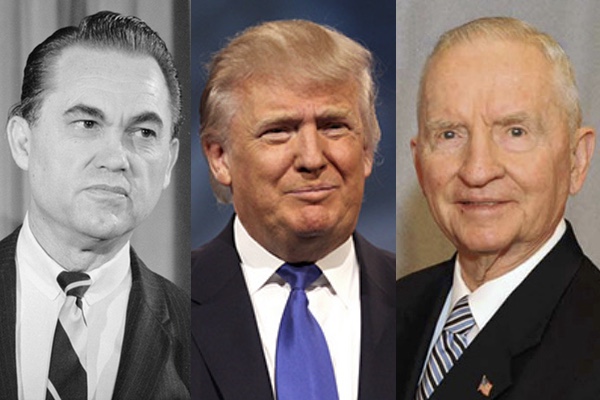A Trump Win Might Wreck the Republican Party

Donald Trump’s rapidly rising candidacy is causing many observers to attempt to analyze whether he is more similar to Billionaire Ross Perot’s Presidential candidacy in 1992 or George C. Wallace’s Presidential candidacy in 1968.
On the surface, one would think that Trump is more like Perot, a billionaire with unlimited funds who was campaigning to change America’s direction, particularly on the issue of the burgeoning national debt. Perot showed insensitivity toward African Americans and other minority groups, and showed instability in his own personality, as when he withdrew from the race and then re-entered it. His support was high enough in public opinion polls, however, that he was permitted to participate in Presidential debates with President George H. W. Bush and Arkansas Governor Bill Clinton, although at the end, Perot ended up winning no states, and therefore, no electoral votes, although winning 18.9 percent of the total national popular vote, the second highest percentage ever in American history, just behind former President Theodore Roosevelt’s 27.5 percent of the vote Progressive (Bull Moose) Party candidacy in 1912. As controversial as Perot was, he never, however, caused the kind of national division that George C. Wallace achieved in 1968, and that it appears that Donald Trump is creating now in 2016.
When one examines George C. Wallace’s American Independent Party candidacy in 1968, one sees a lot of similarities to Trump’s candidacy in 2016. Wallace used incendiary language and racist rhetoric in a way similar to what Donald Trump has displayed toward Mexican American immigrants and Muslims. Wallace aroused his audiences to turn against protesters who showed up at his rallies, just as Trump has done. Both Wallace and Trump have displayed total intolerance of anyone who dares to disagree with them. Both Wallace and Trump have attacked the “Establishment,” the Democrats for Wallace and the Republicans for Trump. Both Wallace and Trump have made totally reckless statements, and drawn support from right wing extremists and hate groups such as the Ku Klux Klan and other White Supremacist groups. Both Wallace and Trump have been unwilling to separate themselves from hate groups or to repudiate them.
Both Wallace and Trump have been “wrecking balls” to the parties they claimed to want to lead, and both have shown total ignorance about world affairs, and really, any detailed understanding of the issues that an American President must face. Both Wallace and Trump have drawn support from frustrated white males, who are insecure due to the growing influence of minorities in America, who they see as taking away their own position in the social rankings of American life. Both Wallace and Trump have appealed to ignorant, poorly educated people, disillusioned with government, and critical of the news media and educated people. Both Wallace and Trump appeal to those who think there are simple answers to complex issues. Finally, both Wallace and Trump are totally opportunists, with no clear cut viewpoints that they believe in, other than their own advancement and aggrandizement.
Wallace won five Southern states in 1968, and 46 electoral votes, the second best third party performance in American history behind TR’s 1912 third party candidacy, which won six states and 88 electoral votes. Wallace also won 13.5 percent of the total national popular vote, the fourth best performance ever in American history. The question is whether there is any possibility of Donald Trump drawing support on the scale of TR or Wallace were he to run on a third party line.
Certainly, IF Trump is the GOP Presidential nominee, he will win most of the South (Wallace territory) and other traditional Republican states, but would have no possibility of winning enough electoral votes to be elected President. Whether as a third party candidate, he could match TR or Wallace in winning five or six states and somewhere between 46 and 88 electoral votes seems highly unlikely.
George C. Wallace may have helped to elect Richard Nixon in 1968, while Ross Perot may have helped to elect Bill Clinton in 1992. Donald Trump represents a candidacy that can destroy the Republican Party as we know it, and elect Hillary Clinton, or even Bernie Sanders, as President. Whether the campaign of Donald Trump can do long term damage to the whole American political system is the more worrisome issue to ponder.